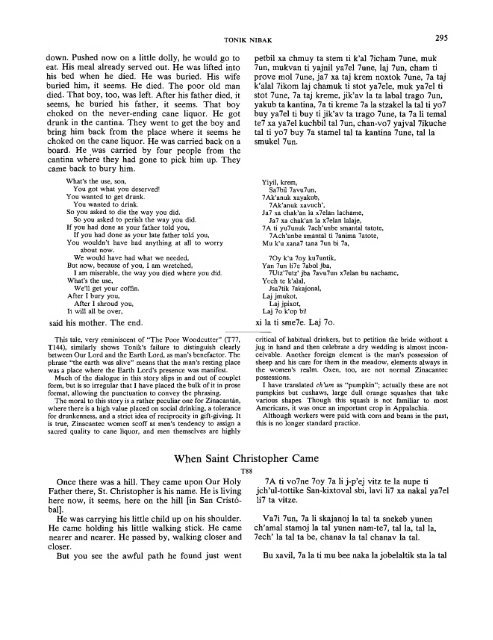PDF (Lo-Res) - Smithsonian Institution Libraries
PDF (Lo-Res) - Smithsonian Institution Libraries
PDF (Lo-Res) - Smithsonian Institution Libraries
Create successful ePaper yourself
Turn your PDF publications into a flip-book with our unique Google optimized e-Paper software.
down. Pushed now on a little dolly, he would go to<br />
eat. His meal already served out. He was lifted into<br />
his bed when he died. He was buried. His wife<br />
buried him, it seems. He died. The poor old man<br />
died. That boy, too, was left. After his father died, it<br />
seems, he buried his father, it seems. That boy<br />
choked on the never-ending cane liquor. He got<br />
drunk in the cantina. They went to get the boy and<br />
bring him back from the place where it seems he<br />
choked on the cane liquor. He was carried back on a<br />
board. He was carried by four people from the<br />
cantina where they had gone to pick him up. They<br />
came back to bury him.<br />
What's the use, son,<br />
You got what you deserved!<br />
You wanted to get drunk.<br />
You wanted to drink.<br />
So you asked to die the way you did.<br />
So you asked to perish the way you did.<br />
If you had done as your father told you,<br />
If you had done as your late father told you,<br />
You wouldn't have had anything at all to worry<br />
about now.<br />
We would have had what we needed,<br />
But now, because of you, I am wretched,<br />
I am miserable, the way you died where you did.<br />
What's the use,<br />
We'll get your coffin.<br />
After I bury you,<br />
After I shroud you,<br />
It will all be over,<br />
said his mother. The end.<br />
This tale, very reminiscent of "The Poor Woodcutter" (T77,<br />
T144), similarly shows Tonik's failure to distinguish clearly<br />
between Our <strong>Lo</strong>rd and the Earth <strong>Lo</strong>rd, as man's benefactor. The<br />
phrase "the earth was alive" means that the man's resting place<br />
was a place where the Earth <strong>Lo</strong>rd's presence was manifest.<br />
Much of the dialogue in this story slips in and out of couplet<br />
form, but is so irregular that I have placed the bulk of it in prose<br />
format, allowing the punctuation to convey the phrasing.<br />
The moral to this story is a rather peculiar one for Zinacantan,<br />
where there is a high value placed on social drinking, a tolerance<br />
for drunkenness, and a strict idea of reciprocity in gift-giving. It<br />
is true, Zinacantec women scoff at men's tendency to assign a<br />
sacred quality to cane liquor, and men themselves are highly<br />
TONIK NIBAK<br />
When Saint Christopher Came<br />
T88<br />
Once there was a hill. They came upon Our Holy<br />
Father there, St. Christopher is his name. He is living<br />
here now, it seems, here on the hill [in San Cristobal].<br />
He was carrying his little child up on his shoulder.<br />
He came holding his little walking stick. He came<br />
nearer and nearer. He passed by, walking closer and<br />
closer.<br />
But you see the awful path he found just went<br />
295<br />
petbil xa chmuy ta stem ti k'al 7icham 7une, muk<br />
7un, mukvan ti yajnil ya7el 7une, laj 7un, cham ti<br />
prove mol 7une, ja7 xa taj krem noxtok 7une, 7a taj<br />
k'alal 7ikom laj chamuk ti stot ya7ele, muk ya7el ti<br />
stot 7une, 7a taj kreme, jik'av la ta labal trago 7un,<br />
yakub ta kantina, 7a ti kreme 7a la stzakel la tal ti yo7<br />
buy ya7el ti buy ti jik'av ta trago 7une, ta 7a li temal<br />
te7 xa ya7el kuchbil tal 7un, chan-vo7 yajval 7ikuche<br />
tal ti yo7 buy 7a stamel tal ta kantina 7une, tal la<br />
smukel 7un.<br />
Yiyil, krem,<br />
Sa7bil 7avu7un,<br />
7Ak'anuk xayakub,<br />
7Ak'anuk xavuch',<br />
Ja7 xa chak'an la x7elan lachame,<br />
Ja7 xa chak'an la x7elan lalaje,<br />
7A ti yu7unuk 7ach'unbe smantal tatote,<br />
7Ach'unbe smantal ti 7anima 7atote,<br />
Mu k'u xana7 tana 7un bi 7a,<br />
7Oy k'u 7oy ku7untik,<br />
Yan 7un H7e 7abol jba,<br />
7Utz'7utz' jba 7avu7un x7elan bu nachame,<br />
Yech te k'alal,<br />
Jsa7tik 7akajonal,<br />
Laj jmukot,<br />
Laj jpixot,<br />
Laj 7o k'op bi!<br />
xi la ti sme7e. Laj 7o.<br />
critical of habitual drinkers, but to petition the bride without a<br />
jug in hand and then celebrate a dry wedding is almost inconceivable.<br />
Another foreign element is the man's possession of<br />
sheep and his care for them in the meadow, elements always in<br />
the women's realm. Oxen, too, are not normal Zinacantec<br />
possessions.<br />
I have translated ch'um as "pumpkin"; actually these are not<br />
pumpkins but cushaws, large dull orange squashes that take<br />
various shapes. Though this squash is not familiar to most<br />
Americans, it was once an important crop in Appalachia.<br />
Although workers were paid with corn and beans in the past,<br />
this is no longer standard practice.<br />
7A ti vo7ne 7oy 7a li j-p'ej vitz te la nupe ti<br />
jch'ul-tottike San-kixtoval sbi, lavi Ii7 xa nakal ya7el<br />
H7 ta vitze.<br />
Va7i 7un, 7a li skajanoj la tal ta snekeb yunen<br />
ch'amal stamoj la tal yunen nam-te7, tal la, tal la,<br />
7ech' la tal ta be, chanav la tal chanav la tal.<br />
Bu xavil, 7a la ti mu bee naka la jobelaltik sta la tal

















